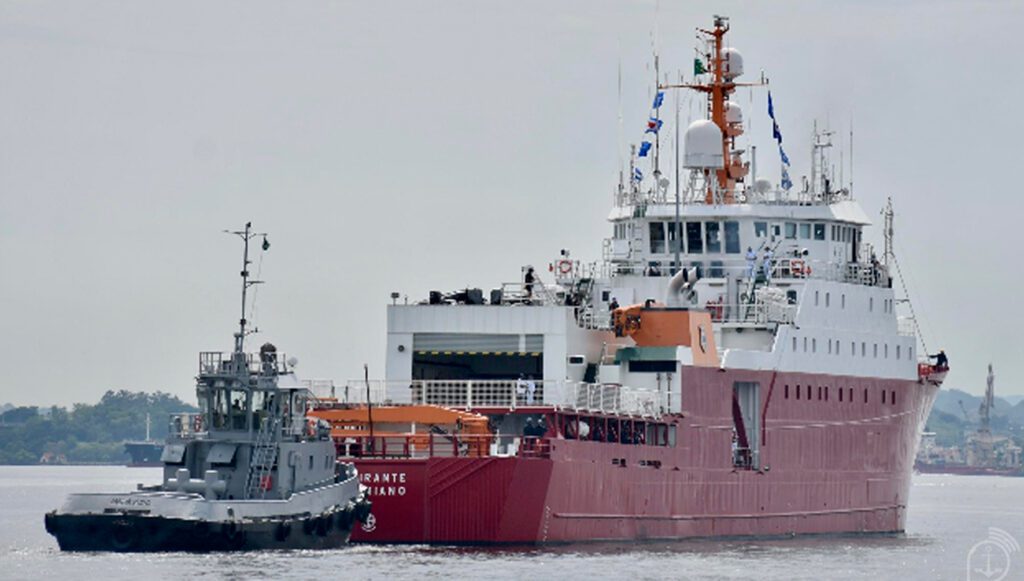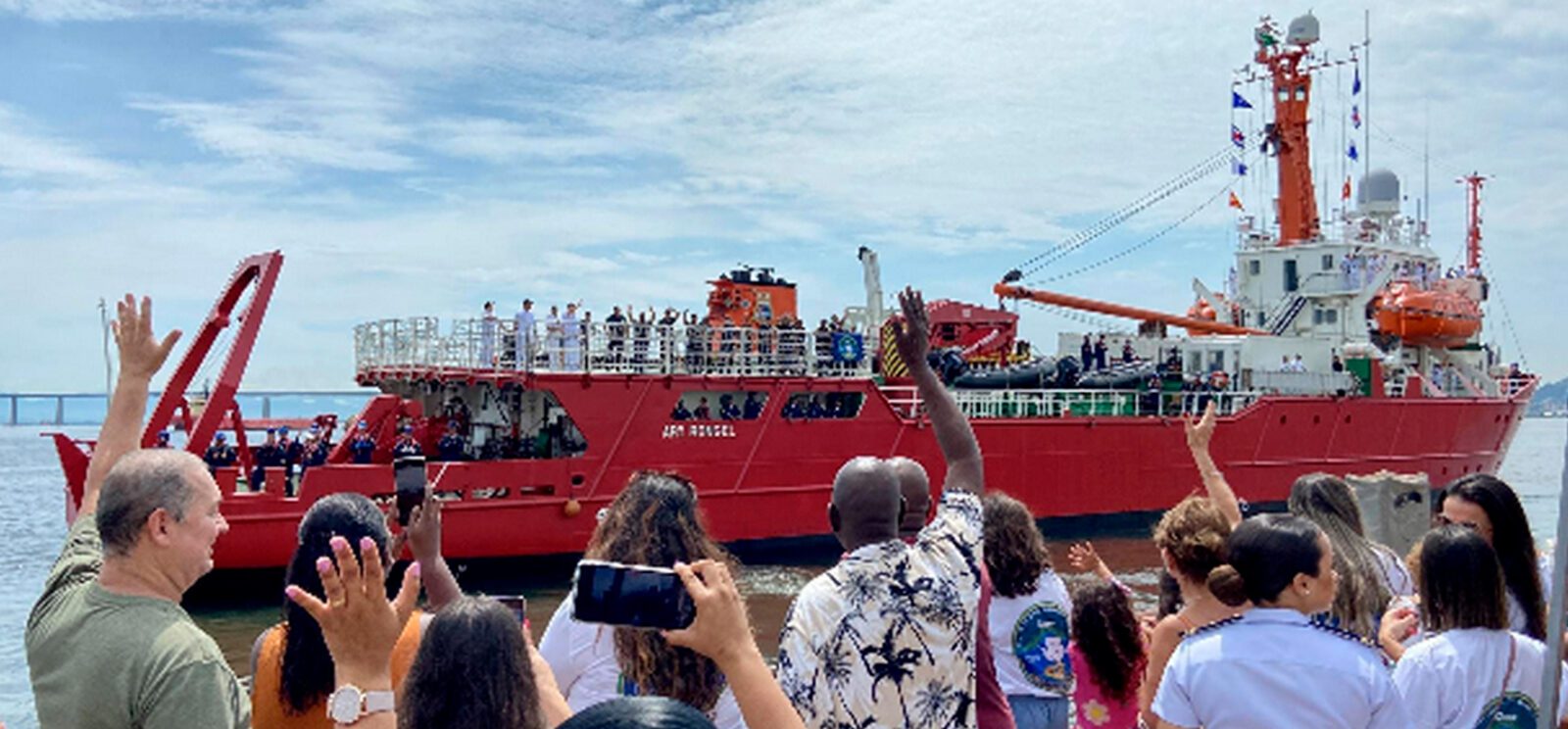OPERANTAR guarantees Brazil’s presence on the frozen continent and the country’s technical and scientific improvement
By First Lieutenant (RM2-T) Thaís Cerqueira – Rio de Janeiro, RJ
On Sunday (8), the Oceanographic Support Ship “Ary Rongel” and the Polar Ship “Almirante Maximiano” began the 42nd Antarctic Operation (OPERANTAR), one of the most complex and extensive operations carried out annually by the Brazilian Navy (MB), which seeks to support the Brazilian presence and research on the southern continent, within the scope of the Brazilian Antarctic Program (PROANTAR).
The ships, which are not due to return to Brazil until April 2024, departed from the Ilha das Cobras Naval Base in Rio de Janeiro, which welcomed friends and family of the crew for a farewell.
In this edition of OPERANTAR, the military personnel will provide logistical support for research projects, take part in the launching and retrieval of scientific camps and will work on hydrographic surveys for the benefit of the “Hydrography Work Plan 2020-2023” of the MB’s Directorate of Hydrography and Navigation.
During the summer, scientific research is carried out on board MB ships, at the Comandante Ferraz Antarctic Station (EACF), in isolated camps and at foreign stations, through cooperation between countries.
The Commander of the Polar Ship “Almirante Maximiano”, Sea and War Captain Dieferson Ramos Pinheiro, highlighted some of the challenges involved in the mission. “Some of the difficulties we’re likely to encounter are adverse weather conditions, psychosocial factors and the wear and tear on the ship’s equipment. As we are in an El Nino year, we are already monitoring the possibility of a greater amount of ice breaking up, which poses a risk to navigation. But the situation is under control,” he said.
At sea, one of the mission’s best-known challenges is crossing the Drake Strait. The region is known for the worst maritime weather conditions in the world, where it is common to encounter waves over ten meters high.
For the Commander of the Oceanographic Support Vessel “Ary Rongel”, Captain Marco Aurelio Barros de Almeida, commanding at sea during OPERANTAR represents the greatest professional achievement of his career. “The possibility of sailing in three different oceans, the Atlantic, Pacific and Antarctic, as well as crossing the always stormy Drake Strait, will bring out in me the true spirit of the men of the sea,” he says.
Base Group
The start of the 42nd OPERANTAR also marks the changeover of the Base Group (GB) that operates at the EACF. The GB is made up of four officers and 13 non-commissioned officers, responsible for operating and maintaining all the station’s systems, as well as providing support for scientific research.
The MB ships left today with the 17 military personnel who will be part of the new GB for a year. These soldiers underwent a rigorous selection process with psychological assessments, psychosocial assessments, health inspections and also took part in Pre-Antarctic Training.
“Over a period of nine months, the GB carries out a complete preparation aimed at safely and efficiently manning the ‘House of Brazil in Antarctica’. In February next year, the station will be 40 years old, and it is a source of personal pride to be part of this long history of success in terms of Brazil’s presence on the sixth continent,” says the future Head of the 2023/2024 EACF Base Group, Frigate Captain Wagner Oliveira Machado.
Partnership with the National Library
In an unprecedented partnership, the “Ary Rongel” is taking a selection of 700 books from the National Library to the EACF. The project aims to bring culture and entertainment to Brazilian researchers working on the Antarctic continent.

PROANTARThe Brazilian Antarctic Program seeks to promote diversified, high-quality scientific research in the Antarctic region, with the aim of understanding the phenomena that occur there, which have global repercussions and, in particular, on Brazilian territory. This research also guarantees Brazil’s status as a Consultative Member of the Antarctic Treaty, which ensures Brazil’s participation in decisions about the future of the Antarctic continent.
Each year, PROANTAR supports, on average, around 20 research projects in various areas such as oceanography, biology, glaciology, geology, meteorology, among others. The projects are selected by the National Council for Scientific and Technological Development (CNPq).
In addition to the ships “Ary Rongel” and “Almirante Maximiano”, the Brazilian Air Force, the various research projects selected by CNPq, the Ministry of Science, Technology, Innovation and Communications (MCTIC), the Ministry of the Environment and Climate Change (MMA), the Ministry of Foreign Affairs, the Antarctic Support Stations in Rio de Janeiro and Rio Grande, and the Secretariat of the Interministerial Commission for the Resources of the Sea (SECIRM) all take part in the planning, coordination and execution of OPERANTAR.
Reinforcement for future OPERANTAR
In the near future, the logistical support provided by MB through OPERANTAR will receive an important boost. Last May, construction began on the Polar Ship “Almirante Saldanha” at the Jurong Aracruz Shipyard in Aracruz (ES). The vessel, which is due to be completed in 2025, will replace the Oceanographic Support Vessel “Ary Rongel”, but will have greater autonomy, more features and improved technical resources, such as navigation and control systems, which will make it easier to get closer to the beach to safely disembark personnel and material.
The new ship will also make it possible to reduce the EACF’s refueling time, thanks to its cranes with greater load and maneuvering capacity, and will be better equipped for launching camps.
Source: Agência Marinha de Notícias
